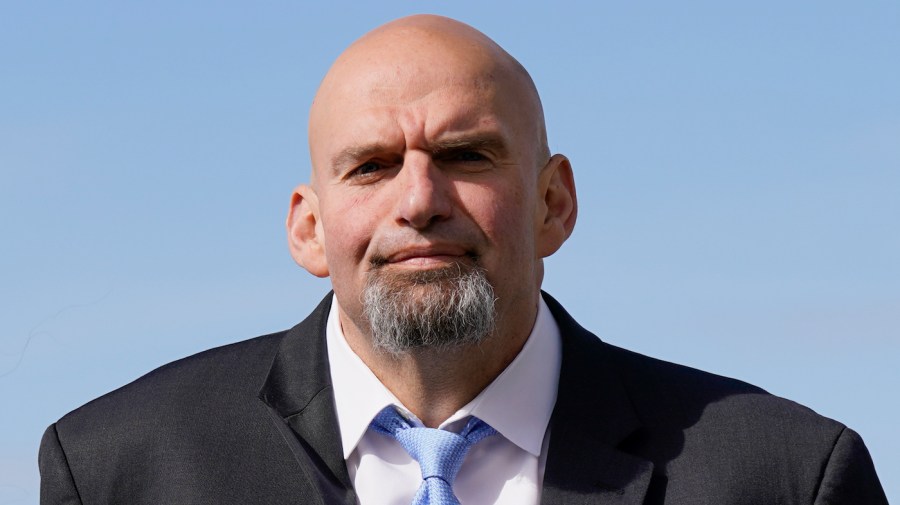Fetterman stroke sparks debate over what’s seen as a disability
Pennsylvania Senate candidate John Fetterman’s (D) difficulties from his recent stroke and the media attention they’ve garnered have sparked a debate about what counts as a disability and perceptions on who is able to serve.
Fetterman’s health was center stage at a Tuesday night debate when he faced off against Republican candidate Mehmet Oz — the only such contest between the two competitors in perhaps the nation’s pivotal race for control of the Senate this year.
The Democrat used a closed captioning system throughout the debate to help him understand questions, and he sometimes struggled to form clear sentences. The performance has raised questions anew about whether voters will back Fetterman in next month’s election.
Advocates for people with disabilities have watched the debate over Fetterman with interest, and say that regardless of his health, it raises questions about how people view those with disabilities.
“I think that most of us … conjure up an image of what it is to be disabled and oftentimes that is some sort of physical mobility disability,” said Emily Blum, executive director of Disability Lead. “That’s an image that a lot of us are very comfortable with because it’s visible.”
“But the vast majority of disabilities are, in fact, invisible,” she continued. “And so we need to change the quote unquote, face of disability to be more representative of that, of mental health disabilities, cognitive, chronic illness. Things that aren’t visible to the eye are what is the face of disability currently.”

Pennsylvania Lt. Gov. John Fetterman, a Democratic candidate for U.S. Senate, stands on the tarmac after greeting President Joe Biden at the 171st Air Refueling Wing at Pittsburgh International Airport in Coraopolis, Pa.
In his first sit-down interview this month after suffering a stroke earlier this year, Fetterman used captioning software so that he could understand questions from NBC’s Dasha Burns. Some disability advocates criticized Burns for highlighting Fetterman’s difficulty understanding aural cues, saying it stigmatized difficulties that technology exists to accommodate.
Critics have defended the scrutiny as part of broader questions about Fetterman’s fitness for office during what can be a difficult-to-predict recovery process.
Disability rights advocates, however, say that the media coverage of Fetterman has raised questions over the perception of who is — and isn’t — allowed to lead with a disability in the halls of Congress.
Fetterman needs the closed captioning system because his stroke left him with an auditory processing disorder that makes it harder for his brain to filter and interpret sounds, according to his doctor, but has “no work restrictions.”
Some activists say Fetterman is being treated unfairly by his political opponents and the press who are making an issue of a disability.
Yet a candidate’s health has generally been seen as a valid political concern. In addition, Fetterman has raised attention by not releasing his full medical records or disclosing his stroke until several days after his hospitalization.
Strokes can be considered a long-term cause of disabilities in adults, particularly as they can affect attention, memory, language and orientation, according to the National Center for Biotechnology Information. Approximately 30 percent of stroke patients develop dementia within one year of their stroke.
Fetterman says his doctors expect him to make a full recovery and he does not have cognitive concerns.
“Overall, the Lt. Governor is recovering well from his stroke and his health has continued to improve,” Dr. Clifford Chen wrote in a letter released by Fetterman’s campaign.
He added that Fetterman “continues to exhibit symptoms of an auditory processing disorder which can come across as a hearing difficulty,” but that his communication has improved significantly.
Pooja Khatri, director of the Vascular Neurology Division within the Department of Neurology and Rehabilitation Medicine at the University of Cincinnati College of Medicine, said that while she is unable to comment on Fetterman’s specific case, auditory processing issues are “quite common” during the stroke recovery process.
“At any given time, I have patients with some sort of aphasia, or even a few in the hospital, some subset of them are going to have auditory processing issues, whether it’s understanding speech or the written word or both,” she said.
“The question of how long such issues typically last in the recovery process is a more complicated matter, Khatri said. Generally, however, if after a stroke a patient retains “some language, it’s a good prognostic sign that they’ll get more over time,” she said. “It tells you that the connections are there, it’s just a matter of healing and working around some of the injury.”

President Roosevelt giving an address on Sept. 14, 1935 in Lake Placid, N.Y.
Speculation around disabilities and how they could affect politicians’ ability to lead goes back decades – the administration of Franklin Roosevelt meticulously concealed the 32nd president’s use of a wheelchair due to polio, and John F. Kennedy was diagnosed with at least two endocrine disorders that were not revealed until after his death.
The stigma surrounding Fetterman’s new disability is two-fold, said Sarah Blahovec, a political consultant and community organizer on disability issues.
Fetterman’s need for accommodations can lead some to wrongly conflate processing issues with cognitive disabilities, Blahovec said.
But disability advocates argue those with cognitive disabilities shouldn’t be shut out of politics, either.
“To say that anyone with a cognitive disability is inherently disqualified from serving in an elected office is just a really big claim that alienates millions of people,” said Blahovec.
Maria Town, president and CEO of American Association of People with Disabilities, said that one’s ability to speak is often thought to indicate their intelligence.
“One of the reasons that people are so quick to question Fetterman’s ability to lead is because it’s his speech that’s impacted, and speech is one of the primary ways that we determine people’s intelligence,” said Town. “We’ve seen issues for people who are non-native English speakers: if they speak with an accent they have to deal with people assuming that they are less intelligent.”
But people also have a habit of trying to determine which disabilities are more deserving of access than others, Town added. This is called the “hierarchy of disability.”
This is at play when leaders like Sen. Tammy Duckworth (D-Illinois) are not questioned on their ability to lead the same way someone like Biden is.
“Sen. Duckworth, she’s a wheelchair user, which I think many people understand as a disability that deserves accommodations: the universal symbol of access is a wheelchair user,” Town said. “Sen. Duckworth’s disabilities were also acquired through her service in the military and so instantly we understand her as having already established her competence.”

Sen. Tammy Duckworth, D-Illinois, bottom left, watches as President Joe Biden signs the COVID-19 Hate Crimes Act, in the East Room of the White House.
Duckworth was also through her rehabilitation period when she ran for office, unlike Fetterman who is still recovering from his stroke.
Meanwhile, Blahovec added, the coverage around Fetterman’s accommodations also misrepresent the hurdle his use of assistive technology creates for his potential duties as a senator.
“It’s just like in any other job – if they can perform the job, with or without accommodation, they can perform the job,” she said.
“Assuming that, you know, someone should not be able to have a job because they need an accommodation, that’s not how it works,” she added. “That’s not how it works under the [Americans With Disabilities Act] as well, because the ADA certainly applies to elected positions.”
Blahovec argues that politicians in both parties have faced similar attacks, from President Biden’s stutter and sometime misstatements to pointing to viral images mocking then-President Trump’s capacity to hold a glass of water or ascend a ramp.
Some disability scholars worry that in the modern era, as stigma around disabilities has seemingly improved, the reaction to Fetterman’s use of captioning tech could have a chilling effect on candidates’ willingness to disclose – or the desire of candidates who can’t or don’t conceal their disabilities to run for office.
Others say Fetterman has been transparent about his condition and that his candidness could help open doors to others.
“John Fetterman has not only been transparent about his stroke and about his recovery, but he’s also been transparent about what his needs are,” said Town. “I think that that’s incredibly powerful; it’s going to be powerful for other stroke survivors, for people with learning disabilities, as well as people with hearing loss that may benefit from captions in the workplace in their communities, or if they choose to run for office.”
Copyright 2024 Nexstar Media Inc. All rights reserved. This material may not be published, broadcast, rewritten, or redistributed..











